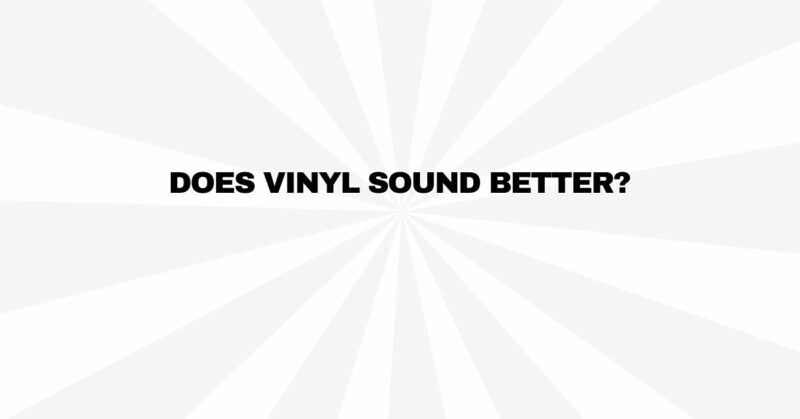The debate over whether vinyl records offer superior sound quality compared to digital formats like CDs and high-resolution audio has been ongoing for decades, captivating the imaginations of audiophiles and music enthusiasts. While the perception of audio quality is highly subjective and influenced by personal preferences, there are factors that contribute to the enduring belief that vinyl sounds better to many. In this article, we will explore the arguments on both sides of the vinyl vs. digital audio debate and examine the unique qualities that make vinyl records so appealing to a dedicated community of enthusiasts.
Analog Warmth and Character:
One of the most frequently cited reasons for the preference of vinyl records is their analog warmth and character. Vinyl records store music in an analog format, with the audio waveform physically etched into the grooves of the record. This analog process captures the continuous nuances of music, resulting in a warm and organic sound that many listeners find more pleasing and emotionally resonant.
Digital audio, on the other hand, relies on quantization and sampling to represent sound as a series of numerical values. While digital audio offers precision and accuracy, it can sometimes be perceived as cold or clinical by those who appreciate the warmth of analog sound.
Tactile Engagement:
Playing a vinyl record is a tactile experience that engages multiple senses. From selecting a record, gently placing the needle on the groove, and watching the record spin, vinyl offers a tangible connection to the music that digital formats cannot replicate. This physical engagement can enhance the overall listening experience, creating a sense of ritual and connection with the music.
Album Art and Packaging:
Vinyl records often feature large, visually striking album art and packaging. These physical aspects of vinyl can add to the overall enjoyment of the music. Collectors and enthusiasts appreciate the tangible nature of vinyl records, including their ability to display artwork and liner notes in a way that digital files cannot.
Nostalgia and Collectibility:
For many, vinyl records evoke a sense of nostalgia and a connection to the history of recorded music. Collecting vinyl records has become a cherished hobby for enthusiasts who appreciate the hunt for rare and vintage releases. The physicality of vinyl records and their association with music history contribute to their enduring appeal.
Subjective Listening Experience:
The perception of whether vinyl sounds better is highly subjective and influenced by a range of factors:
- Equipment: The quality of playback equipment, including turntables, cartridges, amplifiers, and speakers, significantly impacts the listening experience. High-quality equipment can bring out the best in vinyl records, enhancing their perceived sound quality.
- Listening Environment: The acoustic properties of the room where music is enjoyed can affect how it is perceived. Proper room acoustics and speaker placement play a role in the listening experience.
- Personal Preferences: Individual preferences for sound characteristics, such as warmth, detail, and dynamic range, can influence the perceived audio quality of vinyl records.
Digital Advancements and Convenience:
It’s important to note that advancements in digital audio technology have closed the gap between vinyl and digital formats in terms of sound quality. High-resolution audio formats and lossless compression have allowed digital formats to offer exceptional detail and clarity, addressing some of the perceived shortcomings of early digital audio.
Additionally, digital audio offers convenience and portability that vinyl cannot match. With digital formats, listeners can carry vast music libraries in their pockets and access their favorite songs instantly, which is particularly appealing in today’s fast-paced world.
Conclusion:
The question of whether vinyl sounds better than digital audio formats like CDs and high-resolution audio is ultimately a matter of personal preference and the listening experience each format offers. While vinyl records are celebrated for their analog warmth, character, and tactile engagement, digital formats have made significant strides in sound quality and convenience.
For many, the charm of vinyl lies in its unique qualities, including the warmth of analog sound, the ritual of handling records, and the nostalgia associated with the format. Vinyl records continue to hold a special place in the hearts of enthusiasts who appreciate both the music and the experience of playing it. Ultimately, the choice between vinyl and digital audio formats depends on individual tastes, priorities, and the emotional connection one seeks from their music.


